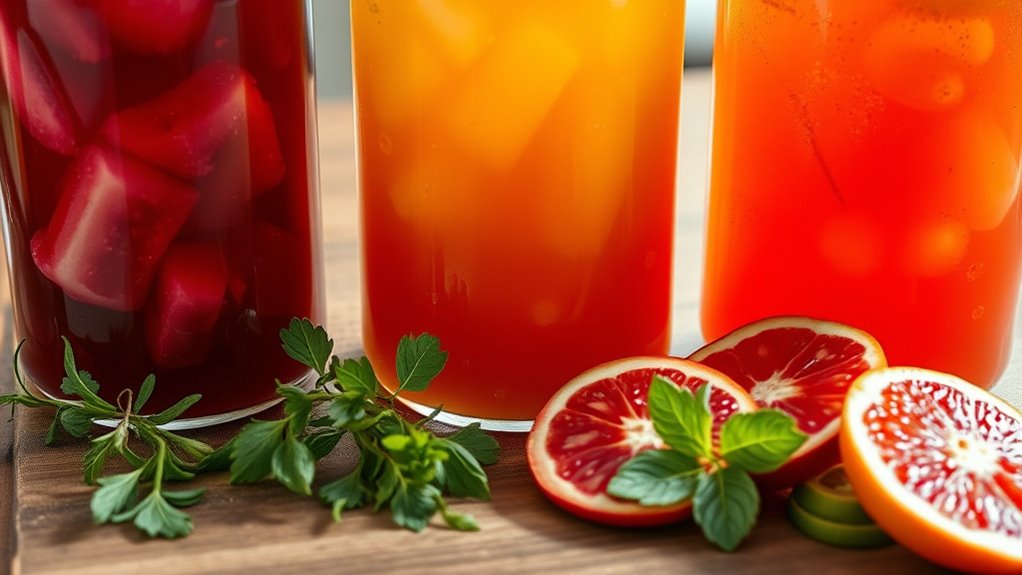Fermented juices are packed with probiotics, antioxidants, and enzymes that support your gut health, boost nutrient absorption, and fight inflammation. To keep them safe, always sanitize your equipment, monitor fermentation signs like bubbles and smell, and discard any batches with mold or strange odors. Proper storage in airtight jars and occasional taste tests help guarantee quality. Keep exploring to discover more tips on enjoying these nourishing beverages safely and effectively.
Key Takeaways
- Fermented juices are rich in probiotics that support gut health and enhance nutrient absorption.
- Proper fermentation involves sanitizing equipment, monitoring temperature, and checking for signs of active fermentation.
- Signs of safe fermentation include bubbles, slight cloudiness, and a tangy aroma; mold or strange smells indicate contamination.
- Using airtight containers and refrigerating slows fermentation and preserves juice quality.
- Fermented juices boost antioxidants, aid digestion, and support immune function, offering long-term health benefits.
The Health Advantages of Drinking Fermented Juices
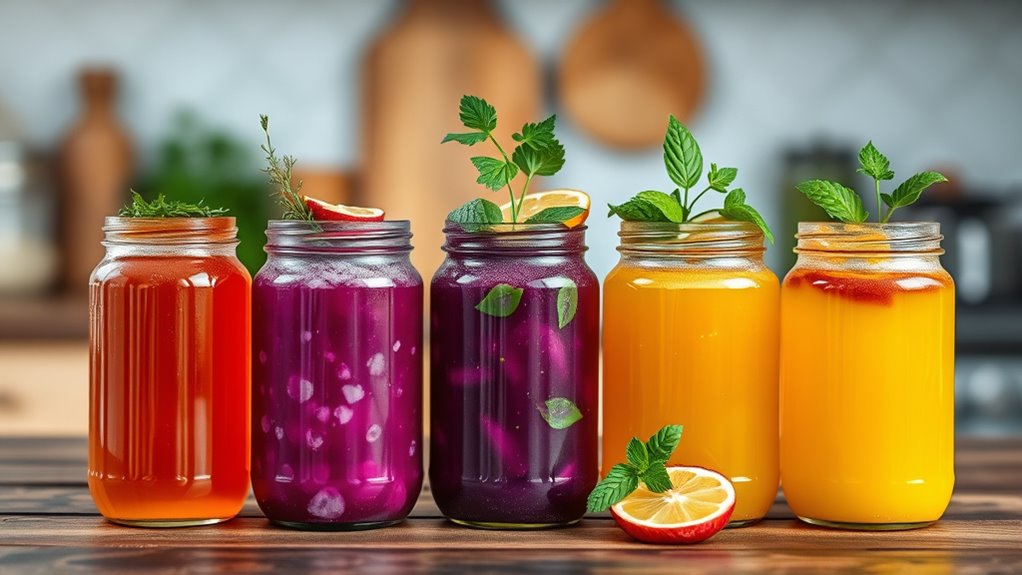
Drinking fermented juices offers several health benefits because they are rich in beneficial probiotics that support your gut health. These probiotics help balance your digestive system, improve nutrient absorption, and strengthen your immune response. Beyond health, fermented juices also showcase exciting flavor combinations, blending tangy, sweet, and sour notes that enhance your drinking experience. Understanding the fermentation history reveals how ancient cultures preserved fruits and vegetables through fermentation, creating nutritious beverages passed down through generations. This process not only enhances flavor but also boosts the bioavailability of nutrients. Additionally, the variety of cultural breakfast traditions demonstrates how fermentation has been integrated into diverse diets worldwide. The presence of antioxidants in fermented juices further contributes to reducing inflammation and protecting cells from oxidative stress. Incorporating fermented juices into your diet can also support gut microbiome diversity, which is crucial for overall health. Modern research increasingly emphasizes the role of microbial diversity in maintaining a balanced gut environment. Fermentation techniques have also been shown to increase the nutrient bioavailability, making vitamins and minerals more accessible for absorption. By choosing fermented juices, you’re embracing a tradition rooted in centuries of food preservation, while enjoying a drink that benefits your overall well-being. It’s a tasty way to support your health naturally.
How Fermentation Boosts Digestive Health
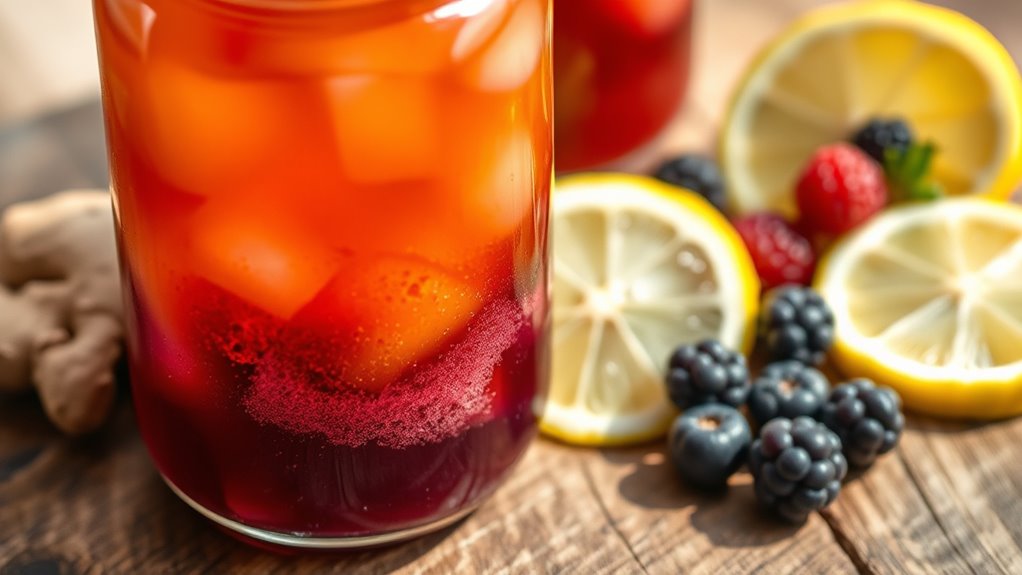
Fermentation helps improve your gut flora balance, making your digestion smoother and more efficient. It also boosts your body’s ability to absorb essential nutrients from food. Additionally, incorporating fermented juices can help manage digestive health, ensuring your system functions optimally over time. The probiotics present in fermented juices can also support immune system functions, aiding overall health. Using fermented juices that contain probiotics can further enhance your intestinal health and overall well-being. Maintaining a healthy microbiome through fermented foods is essential for long-term digestive comfort and resilience. Incorporating different types of fermented juices, such as those made from fruits and vegetables, can further diversify your microbiota and promote a balanced microbial community.
Improves Gut Flora Balance
Because fermentation produces beneficial probiotics, consuming fermented juices can considerably enhance your gut flora balance. These probiotics increase probiotic diversity, which is key to a healthy gut microbiome. When your gut hosts a variety of beneficial bacteria, digestion improves, and immune function strengthens. To maximize these benefits, consider these points:
- Fermented juices introduce new probiotic strains, boosting diversity.
- A balanced gut microbiome helps prevent digestive issues like bloating and discomfort.
- Regular intake supports the growth of beneficial bacteria over harmful ones.
- Enhanced probiotic diversity promotes better digestion and overall gut health.
- Incorporating practices like yoga can further support digestive health and overall well-being.
- Maintaining a healthy lifestyle complements the positive effects of fermented foods on gut health.
- Additionally, maintaining a balanced diet rich in fiber can further support probiotic growth and gut health.
- Understanding the relationship between gut health and overall wellness can motivate consistent consumption of fermented foods.
Enhances Nutrient Absorption
When fermentation occurs, it breaks down complex nutrients in juices into simpler, more digestible forms, making it easier for your body to absorb essential vitamins and minerals. This process activates enzymes that aid digestion, improving nutrient breakdown and utilization. Fermentation also enhances mineral bioavailability, meaning your body can absorb minerals like calcium, magnesium, and iron more efficiently. As enzymes activate, they help access nutrients bound within the juice’s natural matrix, increasing their accessibility. This boosts your overall nutrient intake and supports better health. Additionally, fermentation can modify the nutrient profile of juices, potentially increasing beneficial probiotic content and supporting gut health. Fermentation techniques from Tiny House Designs can optimize nutrient retention and quality. Moreover, the growth of beneficial microbes during fermentation can outcompete harmful bacteria, further improving the safety of fermented juices. The presence of these microbes can also stimulate the production of beneficial compounds that support your spiritual energy, enhancing overall well-being. By improving digestion and nutrient absorption, fermented juices help guarantee you get the most out of the vitamins and minerals they provide, contributing to better energy, immunity, and digestive health. Furthermore, fermentation can reduce harmful substances and improve safety by inhibiting the growth of spoilage microbes, making fermented juices a safer choice.
Common Types of Fermented Juices and Their Benefits

You’ll find that popular fermented juices like kefir and kombucha offer unique health benefits, from improved digestion to boosted immunity. Understanding the fermentation process helps you appreciate how these drinks develop their probiotic qualities. Incorporating lifestyle habits such as remote work can also influence your overall health and wellness. Let’s explore the different types and how they can enhance your well-being.
Popular Fermented Juices
Have you ever wondered which fermented juices pack the most health benefits? These popular drinks have a rich fermentation history and offer unique flavor variations. Here are four top choices:
- Kombucha – A tangy, slightly effervescent tea, known for probiotics and detox properties.
- Kefir – A creamy, yogurt-like beverage made from fermented milk, rich in beneficial bacteria.
- Kvass – A traditional fermented rye or beet juice with a mildly sour taste, popular in Eastern Europe.
- Jun – A honey-based fermented tea with a delicate sweetness and gentle probiotic boost.
Each of these fermented juices combines distinct flavor profiles with health benefits, making them popular choices worldwide.
Health Advantages Overview
Fermented juices are celebrated not only for their unique flavors but also for their impressive health benefits. Different types offer a variety of flavor variations, from tangy to sweet, catering to various tastes. The fermentation timeline influences these flavors, with shorter periods producing milder tastes and longer ones developing deeper, more complex profiles. These juices are rich in probiotics, which support your gut health and boost your immune system. They can improve digestion, increase nutrient absorption, and reduce inflammation. Additionally, some fermented juices contain antioxidants that fight free radicals. By choosing different fermented juices, you can enjoy a range of health benefits tailored to your needs. Their diverse flavors make incorporating them into your diet both enjoyable and nutritious.
Fermentation Process Insights
Among the most popular fermented juices are kefir, kombucha, and kvass, each offering unique flavors and health benefits. When exploring fermentation process insights, choosing the right fermentation vessel is vital. Glass jars or food-grade plastic containers are ideal for ease of cleaning and safety. Maintaining proper fermentation temperature control is essential; most juices ferment best between 70-85°F. Here are key points to consider:
- Select vessels with airtight lids to prevent contamination.
- Keep temperatures steady to avoid spoilage.
- Use a thermometer to monitor fermentation temperature.
- Stir or mix juices gently to promote even fermentation.
Essential Safety Tips for Homemade Fermented Beverages

Ensuring safety when making homemade fermented beverages is essential to prevent spoilage and potential health risks. Start with thorough equipment sanitation; clean all tools and jars before use to avoid unwanted bacteria. Understanding the fermentation timeline helps you monitor progress and avoid overfermentation, which can lead to spoilage. Use the table below to guide your process:
| Step | Key Action | Timeframe |
|---|---|---|
| Preparation | Sanitize all equipment | Before starting |
| Fermentation Start | Add ingredients and starter | Day 1 |
| Monitoring | Check for bubbles and smell | Every 2-3 days |
| Completion | Once fermentation completes | Typically 1-3 weeks |
Stick to these safety tips, and you’ll produce delicious, safe fermented juices every time.
Recognizing Signs of Proper Fermentation and Potential Contamination
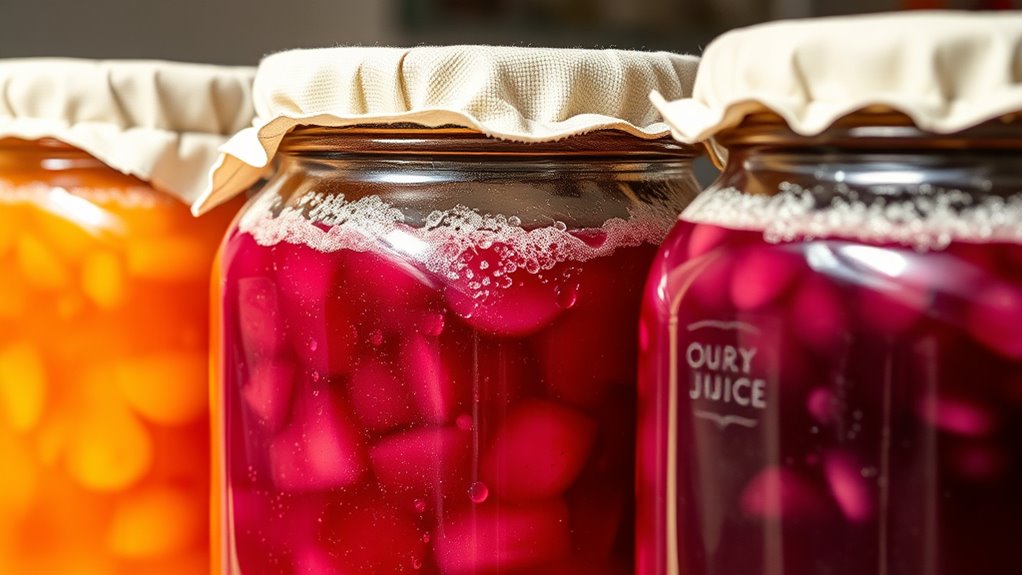
Monitoring your homemade fermented juices is key to confirming they’re developing correctly. Pay attention to visual cues that signal proper fermentation, like bubbles forming and a slight cloudy appearance. These are signs your juice is actively fermenting. Watch for contamination indicators such as mold, strange odors, or slimy textures, which suggest spoilage.
Here are some signs to look for:
- Bubbles and fizz in the jar
- Slight cloudiness without mold
- Pleasant, tangy aroma
- Absence of mold, slimy films, or foul smell
If you notice any contamination indicators, discard the batch immediately. Proper visual cues affirm your fermentation process, while contamination signs warn you to stay safe and avoid consuming spoiled juice.
Best Practices for Storing and Preserving Fermented Juices
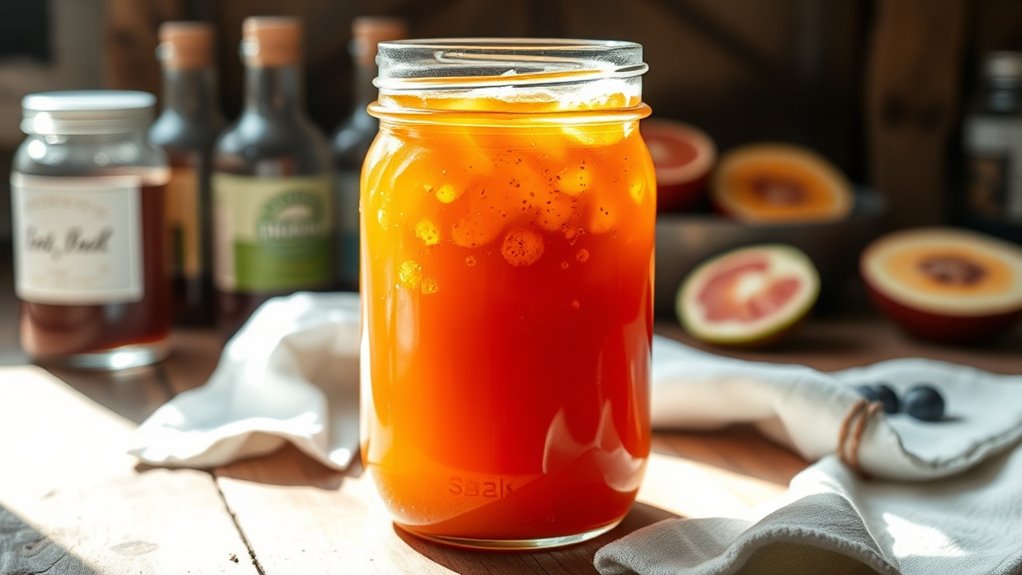
Proper storage is essential to maintaining the quality and safety of your fermented juices. Use clean, airtight containers to prevent contamination and preserve carbonation. Keep your fermented juices refrigerated to slow down fermentation and extend shelf life. Consistent temperature control is crucial; avoid temperature fluctuations that can spoil the product. Label your jars with fermentation dates to assist with shelf life management, so you consume them while still fresh. When storing, leave some headspace to accommodate slight expansion. Regularly check for signs of spoilage, like off-odors or mold. Proper storage techniques help retain nutrients, flavor, and probiotic benefits. By following these best practices, you ensure your fermented juices stay safe, tasty, and effective for as long as possible.
Tips for Incorporating Fermented Juices Into Your Daily Routine
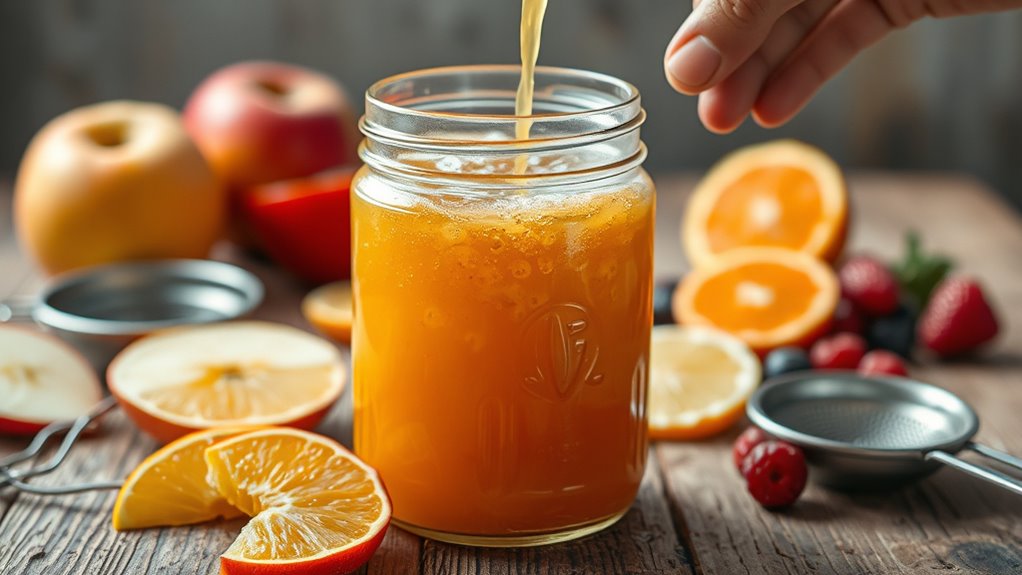
Incorporating fermented juices into your daily routine is a simple way to boost your overall health and enjoy their unique flavors. To make the most of them, try these tips:
- Start your day with a small glass to kickstart digestion and enhance flavor pairing with your breakfast.
- Mix fermented juices into smoothies or salads for flavor enhancement and variety.
- Use them as a marinade or dressing to add depth and complexity to your meals.
- Experiment with flavor pairing by combining different fermented juices to discover new taste combinations.
Frequently Asked Questions
Are There Any Known Allergies Related to Fermented Juice Consumption?
You might wonder if fermented juice causes allergies. While rare, some people with fruit allergies could react to certain fermented options due to cross-reactivity. Additionally, those with histamine sensitivity may experience symptoms like headaches or rashes because fermentation increases histamine levels. If you’re prone to fruit allergies or histamine issues, it’s best to consult your healthcare provider before trying fermented juices to avoid adverse reactions.
Can Fermented Juices Be Safely Made With Any Fruit or Vegetable?
Imagine turning any fruit or vegetable into a probiotic-rich beverage; it sounds exciting, but not all are equally compatible. You should consider fruit compatibility and fermentation variability, as some produce undesirable flavors or harmful microbes. While many fruits and vegetables ferment well, others might not, especially if they contain low sugar or high acidity. Always research specific produce, monitor fermentation, and guarantee safety to enjoy your fermented juices risk-free.
How Long Can Homemade Fermented Juices Be Stored Safely?
You can generally store homemade fermented juices for about 1 to 3 months, but always watch for spoilage indicators like foul smell, mold, or bubbling excess. Proper storage duration depends on fermentation quality and temperature. Keep your jars in the fridge to slow spoilage, and check regularly for any signs of spoilage. When in doubt, discard the juice to ensure safety and enjoy your homemade fermented drinks safely.
Are There Specific Tools Recommended for Fermenting Juices at Home?
You won’t believe the tools needed for perfect homemade fermented juices! To guarantee success, you’ll want to use sturdy fermentation jars that keep out unwanted bacteria and maintain ideal conditions. A pH meter is also essential—think of it as your secret weapon to monitor acidity levels precisely. With these tools, you’ll transform simple ingredients into probiotic-packed masterpieces, making your fermentation process safer, easier, and more predictable than ever before!
What Are the Potential Risks of Consuming Improperly Fermented Juices?
You should be aware that consuming improperly fermented juices can pose contamination risks, leading to harmful bacteria or mold growth. Fermentation failures may result in off-flavors or spoilage, which can cause stomach upset or food poisoning. If you don’t follow proper safety steps, you risk ingesting dangerous microorganisms. Always guarantee your juices ferment correctly and watch for signs of spoilage to avoid these health risks.
Conclusion
Incorporating fermented juices into your routine can boost your digestion and overall health. Some worry about safety, but with proper fermentation and storage, you’re safe to enjoy these nutritious drinks. Just follow the tips to recognize signs of proper fermentation and avoid contamination. Don’t be discouraged by the process—once you get the hang of it, making and savoring your own fermented juices is simple, fun, and truly rewarding for your well-being.
